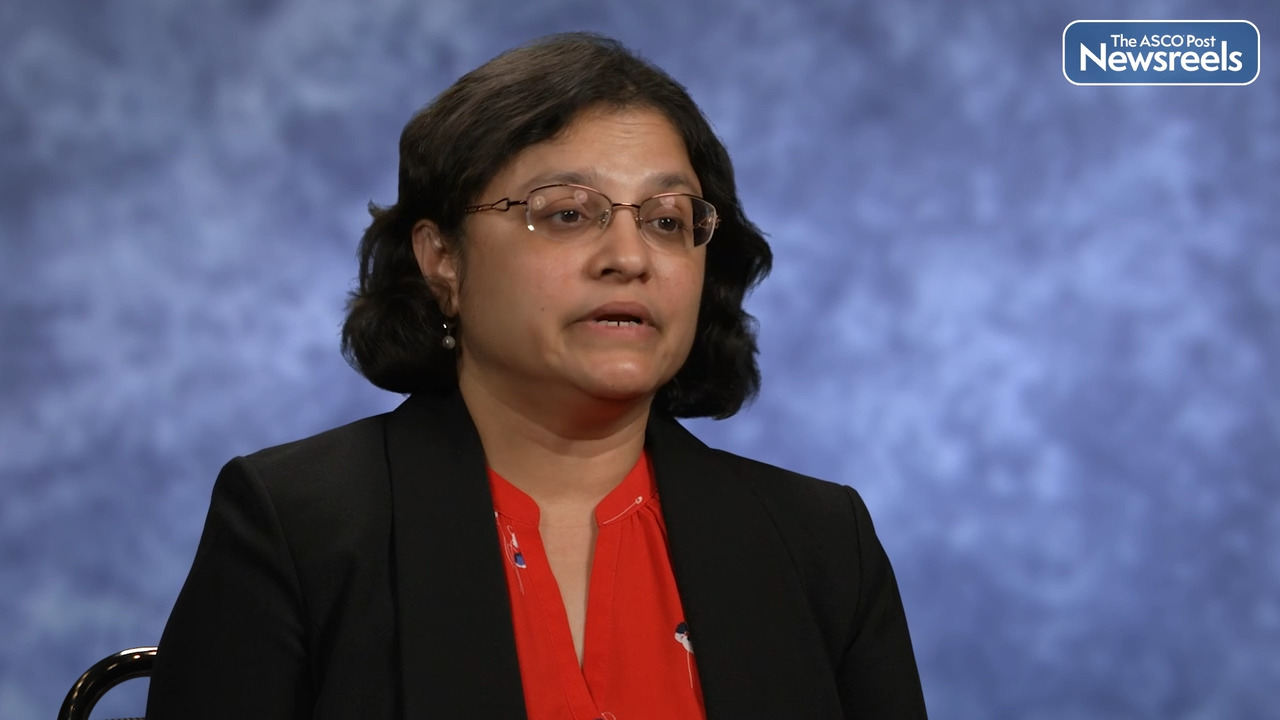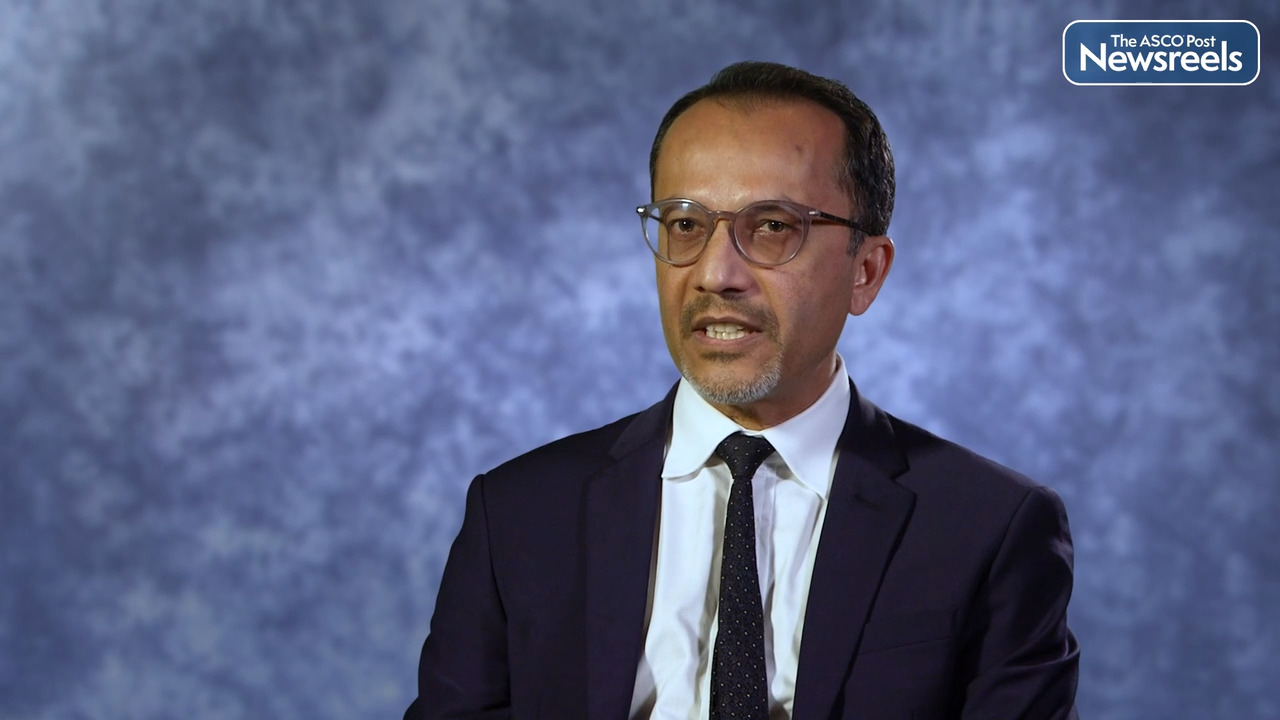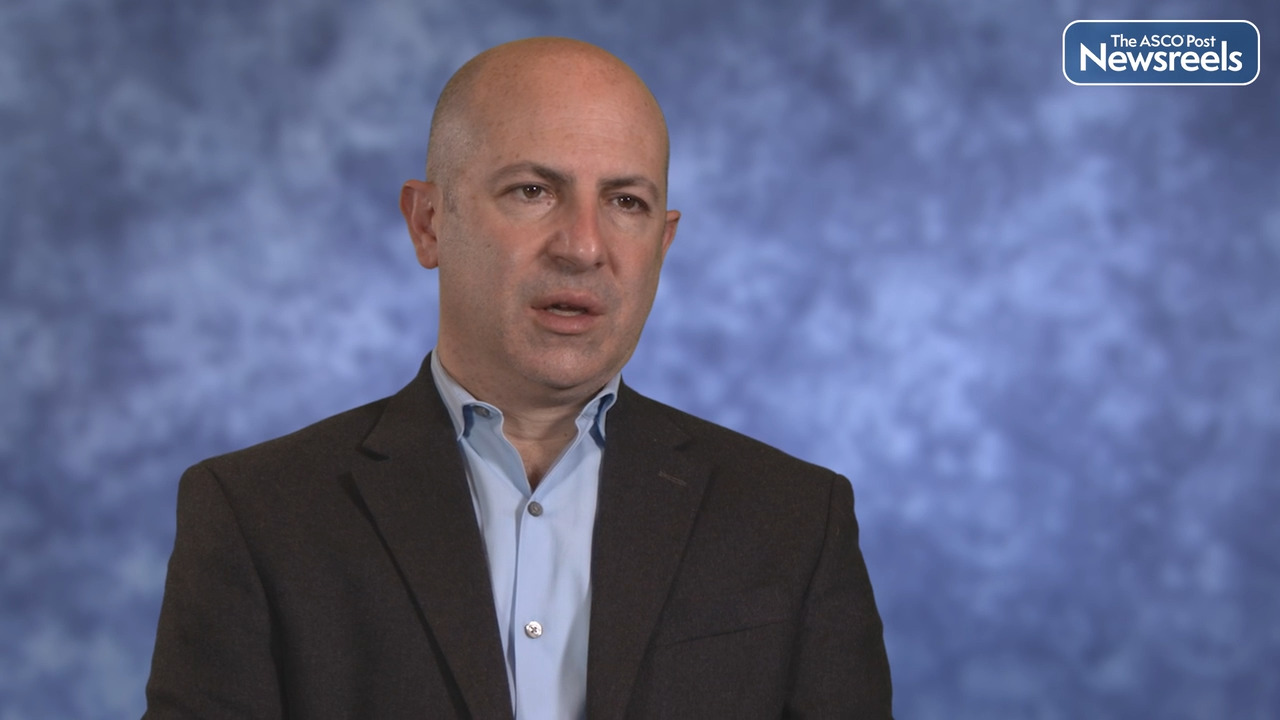ctDNA Analysis May Predict Optimal Treatment for Patients With GIST
Circulating tumor DNA (ctDNA) analysis of KIT exon mutations may help predict which second-line therapy is best for patients with advanced gastrointestinal stromal tumor (GIST), according to data presented by Bauer et al during the January ASCO Plenary Series session (Abstract 397784). An...
Analysis of Mutations Associated With High Tumor Mutation Burden in Microsatellite-Stable Gastrointestinal Cancers
In a study reported in The Lancet Oncology, Wang et al identified mutations linked to high tumor mutation burden in microsatellite-stable (MSS) gastrointestinal cancers that may be associated with efficacy of immune checkpoint inhibitor therapy. Study Details Molecular alterations in 48,606...
Manik A. Amin, MD, on Novel Immune Therapies in GI Cancers: What’s on the Horizon?
Manik A. Amin, MD, of Dartmouth Cancer Center, discusses the future of immunotherapy in gastrointestinal cancers, the challenges of creating effective adoptive cell therapies, and the next generation of immune checkpoint inhibitors.
Subset of Patients With Advanced Gastric/GEJ Cancer May Benefit From CLDN18.2-Targeted Drug Zolbetuximab: SPOTLIGHT Study
Initial data from the global phase III SPOTLIGHT trial could herald the use of a new targeted agent for a subset of patients with advanced gastric or gastroesophageal junction (GEJ) adenocarcinoma. First-line treatment with zolbetuximab, which targets the transmembrane protein claudin 18.2...
Molecular Tumor Board Offers Assistance That May Boost Effectiveness of Precision Oncology
The field of precision oncology has become so complex that even experienced oncologists can find it challenging to decipher the molecular test results of tumor tissue and navigate treatment options for patients. Investigators revealed that a new program may aid gastrointestinal cancer physicians in ...
Endoscopic Surveillance With Systematic Random Biopsy vs Targeted Biopsy for Early Diagnosis of Hereditary Diffuse Gastric Cancer
In a UK study reported in The Lancet Oncology, Lee et al found that systematic random biopsies were more likely than endoscopically targeted biopsies to first detect signet ring cell carcinoma during endoscopic surveillance of individuals meeting testing criteria for hereditary diffuse gastric...
T-DXd in Pretreated Patients With HER2-Low Advanced Gastric or Gastroesophageal Junction Adenocarcinoma
As reported in the Journal of Clinical Oncology by Yamaguchi et al, an exploratory cohort analysis in a Japanese/South Korean phase II trial (DESTINY-Gastric01) indicated that fam-trastuzumab deruxtecan-nxki (TDX-d) showed activity in previously treated—but anti-HER2 treatment–naive—patients with...
Addition of Bemarituzumab to mFOLFOX in FGFR2b-Selected Gastric or Gastroesophageal Junction Adenocarcinoma
In the phase II FIGHT trial reported in The Lancet Oncology, Zev A. Wainberg, MD, and colleagues found numerically better progression-free survival with the addition of the anti-FGFR2b antibody bemarituzumab to mFOLFOX (modified fluorouracil, leucovorin, and oxaliplatin) in patients with...
Association of Autoantibodies to Gastric Mucosa and Risk of Gastric Cancer
In a case-control study reported in JAMA Oncology, Minkyo Song, MD, PhD, and colleagues found that seropositivity for gastric antiparietal cell antibodies (APCAs) was associated with an increased risk of gastric cancer among younger Finnish women who were seronegative for antibodies to Helicobacter ...
Etoposide/Cisplatin vs Irinotecan/Cisplatin in Advanced Digestive System Neuroendocrine Carcinoma
In a Japanese phase III trial (TOPIC-NEC) reported in JAMA Oncology, Morizane et al found no difference in overall survival with etoposide/cisplatin (EP) vs irinotecan/cisplatin (IP) in chemotherapy-naive patients with advanced digestive system neuroendocrine carcinoma. Study Details The open-label ...
Neoadjuvant Nivolumab Plus Ipilimumab in Localized dMMR/MSI-H Gastric Cancer
As reported in the Journal of Clinical Oncology by Thierry André, MD, and colleagues, the French (GERCOR) phase II NEONIPIGA trial has shown a high pathologic complete response rate with nivolumab/ipilimumab neoadjuvant therapy in patients with localized deficient mismatch repair...
INTRIGUE Trial: Second-Line Ripretinib vs Sunitinib in Advanced GIST
As reported in the Journal of Clinical Oncology by Bauer et al, the phase III INTRIGUE trial showed no significant progression-free survival benefit with second-line ripretinib vs sunitinib in imatinib-pretreated patients with gastrointestinal stromal tumor (GIST), including among patients with KIT ...
5-Year Outcomes With Laparoscopic vs Open Distal Gastrectomy in Locally Advanced Gastric Cancer
In the 5-year follow-up of the Korean KLASS-02 trial reported in JAMA Surgery, Son et al found similar 5-year overall survival and relapse-free survival among patients with R0 resection using laparoscopic vs open distal gastrectomy in patients with locally advanced gastric cancer. Late...
NCCN Clinical Practice Guidelines in Oncology: 2022 Updates
In 1996, the National Comprehensive Cancer Network® (NCCN®) published its first set of Clinical Practice Guidelines in Oncology® covering eight tumor types. Guidelines are now published for more than 60 tumor types, subtypes, and topics. During the NCCN’s 27th Annual Conference, which was again...
Gulam A. Manji, MD, PhD, on Gastric and Gastroesophageal Junction Adenocarcinomas: New Data on Pembrolizumab Plus Capecitabine and Oxaliplatin
Gulam A. Manji, MD, PhD, of Columbia University Medical Center, discusses phase II results on perioperative combination chemotherapy and pembrolizumab in patients with resectable gastric cancer. The combination appeared to result in many complete pathologic responses (Abstract CT009).
Study Explores Racial Disparities Among Patients Undergoing Gastrointestinal Cancer Surgery
Black adult patients are more likely than White patients to receive substandard gastrointestinal cancer surgery, according to a large study led by researchers at Yale Cancer Center published by Bakkila et al in JAMA Network Open. “The COVID-19 pandemic has brought to light previously reported race...
KEYNOTE-811: Pembrolizumab Plus Trastuzumab and Chemotherapy in Previously Untreated Advanced HER2-Positive Gastric Adenocarcinoma
As reported in Nature by Yelena Y. Janjigian, MD, of the Gastrointestinal Oncology Service at Memorial Sloan Kettering Cancer Center, and colleagues, the first interim analysis of the phase III KEYNOTE-811 trial has shown a significantly higher objective response rate with the addition of...
Recent FDA Approvals in Gastrointestinal Cancer
Over the past year, the U.S. Food and Drug Administration granted approval to several novel drugs and new indications for older therapeutic agents used in gastrointestinal oncology. Cetuximab Plus Encorafenib On September 28, 2021, cetuximab (Erbitux) was approved in combination with encorafenib...
Adding First-Line Nivolumab to Chemotherapy Improves Survival in Gastric, Gastroesophageal Junction, and Esophageal Adenocarcinomas
As reported in The Lancet by Yelena Y. Janjigian, MD, of the Gastrointestinal Oncology Service, Memorial Sloan Kettering Cancer Center, and colleagues, the phase III CheckMate 649 trial has shown that the addition of first-line nivolumab to chemotherapy resulted in improved overall and...
Younger Patients With Appendicitis May Be at Increased Risk for Appendiceal Cancer
Although appendectomy is still the most effective treatment for acute appendicitis, nonoperative management is increasingly common, as recent studies—such as one published in November 2020 in The New England Journal of Medicine and a second published in December 2021 in the same journal—have shown...
Cancer Risk Among Patients With Pediatric-Onset Inflammatory Bowel Disease
In a meta-analysis of population-based studies reported in JAMA Network Open, Elmahdi et al found that although the reported incidence of cancers in individuals with pediatric-onset inflammatory bowel disease (IBD) is low, the condition is associated with a significantly increased risk of cancers...
Expert Point of View: Stefano Cascinu, MD
Stefano Cascinu, MD, of the Comprehensive Cancer Center, Università Vita-Salute, IRCCS-Ospedale San Raffaele, Milan, Italy, was the invited discussant of KEYNOTE-5901 and CheckMate 649.2 “These landmark studies could change the treatment paradigm of advanced esophageal and gastric cancers. They...
Checkpoint Inhibitors in Esophagogastric Cancer: Updates of Landmark Trials
Updates of landmark trials of immune checkpoint inhibitors as first-line therapy for advanced HER2-negative esophagogastric cancers were presented at the 2022 ASCO Gastrointestinal Cancers Symposium. The studies upheld previous findings of an overall survival benefit when these agents are paired...
Updated Findings on T-DXd in Gastrointestinal Malignancies
Updates of phase II studies evaluating fam-trastuzumab deruxtecan-nxki (T-DXd) in gastrointestinal cancers were presented at the 2022 ASCO Gastrointestinal Cancers Symposium, continuing to offer support for the antibody-drug conjugate in these malignancies. In HER2-expressing gastric cancer, T-DXd...
Pembrolizumab Plus Trastuzumab and Chemotherapy in Previously Untreated Advanced HER2-Positive Gastric Adenocarcinoma
As reported in Nature by Yelena Y. Janjigian, MD, and colleagues, the first interim analysis of the phase III KEYNOTE-811 trial has shown a significantly higher objective response rate with the addition of pembrolizumab to trastuzumab and chemotherapy in patients with previously untreated advanced ...
KRYSTAL-1: Adagrasib Controls Disease in Gastrointestinal Malignancies Beyond Colorectal Cancer
A disease control rate of 100% was achieved in gastrointestinal cancers treated with the KRAS G12C inhibitor adagrasib in the phase II KRYSTAL-1 trial, presented at the 2022 ASCO Gastrointestinal Cancers Symposium.1 The population included primarily those with pancreatic cancer; other noncolorectal ...
Assessing Value in Gastrointestinal Cancer Treatments
The era of precision oncology, in which molecular biomarkers are used to help guide drug delivery, has dovetailed with the emerging issues of value-based care and cost containment. To shed light on these issues and more, The ASCO Post spoke with Hanna K. Sanoff, MD, MPH, Clinical Medical Director...
Binimetinib Plus Imatinib in Previously Untreated Patients With Advanced Gastrointestinal Stromal Tumor
In a single-center phase II trial reported in the Journal of Clinical Oncology, Chi et al found that the combination of the MET inhibitor binimetinib and the KIT inhibitor imatinib produced a high response rate in patients with previously untreated advanced gastrointestinal stromal tumor. As stated ...
Francesca Battaglin, MD, on Upper GI Cancers and the Potential Value of Recurrent Neoantigens
Francesca Battaglin, MD, of USC Norris Comprehensive Cancer Center and the Keck School of Medicine, discusses findings from one of the largest studies to investigate recurrent neoantigens in upper gastrointestinal cancers. Dr. Battaglin and her team identified peptides with high human leukocyte antigen–binding affinity and an association with a positive tumor inflammation signature in both microsatellite-instable and microsite-stable tumors, suggesting a role for such antigens as potential cancer immunotherapy targets (Abstract 246).
Zev A. Wainberg, MD, on Gastric or Gastroesophageal Junction Adenocarcinoma: Follow-up Data on Pembrolizumab and Chemotherapy
Zev A. Wainberg, MD, of the University of California, Los Angeles, discusses an update, of 25 additional months, on phase III safety and efficacy results from the KEYNOTE-062 trial. This study compared pembrolizumab with or without chemotherapy vs chemotherapy alone for patients with PD-L1–positive advanced gastric or gastroesophageal junction adenocarcinoma (Abstract 243).
Similar Efficacy—but Better Tolerability—for Ripretinib vs Sunitinib in Previously Treated Patients With Advanced GIST
In the INTRIGUE trial, the tyrosine kinase inhibitor ripretinib was not superior to sunitinib in the second-line treatment of patients with advanced gastrointestinal stromal tumors (GIST); however, the agent was better tolerated. These findings were presented by Michael C. Heinrich, MD, FACP, and...
Yu Sunakawa, MD, PhD, on Gastric Cancer: Predicting Treatment-Related Toxicities With Biomarkers
Yu Sunakawa, MD, PhD, of Japan’s St. Marianna University School of Medicine, discusses his findings from the DELIVER trial, which suggest the gut microbiome may predict skin toxicities in patients with advanced gastric cancer who are treated with nivolumab. In addition, some single nucleotide polymorphisms, such as NOTCH1, SEMA4D, NLRC5, and IL-6R genes, may potentially become markers for diarrhea and skin toxicities with this agent.
Kohei Shitara, MD, on Gastric and Esophageal Cancers: Long-Term Follow-up on Nivolumab Plus Chemotherapy
Kohei Shitara, MD, of Japan’s National Cancer Center Hospital East, discusses a long-term data follow-up from CheckMate 649, which support the continued use of nivolumab plus chemotherapy as first-line treatment in patients with advanced gastric, gastroesophageal junction, and esophageal adenocarcinomas (Abstract 240).
Addition of Nivolumab to Oxaliplatin-Based Chemotherapy for HER2-Negative, Unresectable, Advanced or Recurrent Gastric or Gastroesophageal Junction Cancer
In an Asian phase II/III trial (ATTRACTION-4) reported in The Lancet Oncology, Yoon-Koo Kang, MD, and colleagues found that the addition of nivolumab to oxaliplatin-based chemotherapy improved progression-free survival—but not overall survival—as first-line treatment of HER2-negative, unresectable, ...
Presurgical Chemosensitivity May Play a Role in Informing Postsurgical Treatment for Patients With Gastric Cancer
A study published by Deng et al in JAMA Network Open showed that chemotherapy after surgery for gastric adenocarcinoma was significantly associated with longer survival in patients with chemosensitive disease, but not in those with very sensitive or refractory disease. These findings suggest that...
Association of Autoantibodies to Gastric Mucosa and Risk of Gastric Cancer
In a case-control study reported in JAMA Oncology, Minkyo Song, MD, PhD, and colleagues found that seropositivity for gastric antiparietal cell antibodies (APCAs) was associated with an increased risk of gastric cancer among younger Finnish women who were seronegative for antibodies to Helicobacter ...
Study Suggests Lack of Benefit With the Addition of Immune Checkpoint Inhibition to Chemotherapy in Low PD-L1–Expressing Gastric or Esophageal Adenocarcinoma
In an analysis reported in the Journal of Clinical Oncology, Zhao et al found that the addition of an immune checkpoint inhibitor to chemotherapy in trials of first-line treatment of advanced gastric or esophageal adenocarcinoma was not associated with benefit in low PD-L1–expressing subgroups not...
Addition of FDG-PET/CT and Staging Laparoscopy to the Initial Staging of Locally Advanced Gastric Cancer
In a Dutch cohort study (PLASTIC) reported in JAMA Surgery, Gertsen et al found that staging laparoscopy provided more diagnostic information resulting in change of treatment intent than F-18 fluorodeoxyglucose positron-emission tomography/computed tomography (FDG-PET/CT) in patients with...
Areej El-Jawahri, MD, on the Significance of Patient-Reported Outcomes in Gastrointestinal Cancers
The invited discussant of this study on patient-reported outcomes, Areej El-Jawahri, MD, Associate Director of Cancer Outcomes Research and Education Program and Director of Bone Marrow Transplant Survivorship Program at Massachusetts General Hospital, said these findings underscore the importance...
Patient-Reported Outcomes in Gastrointestinal Cancers: Predicting Treatment Response and Survival Outcomes
According to data presented during the 2021 ASCO Quality Care Symposium,1 1-month changes in patient-reported outcomes may predict treatment response and survival outcomes in patients with advanced gastrointestinal cancers. The results of a prospective study of 159 patients with metastatic...
Overall Survival With Laparoscopic vs Open Distal Gastrectomy for Locally Advanced Gastric Cancer
As reported in JAMA Surgery by Huang et al, the Chinese phase III CLASS-01 trial has shown no difference in 5-year overall survival in patients with locally advanced gastric cancer who underwent laparoscopic vs open distal gastrectomy. The previously reported primary analysis of the trial showed no ...
Rates of Occult Gastric Carcinoma in Patients With Hereditary Lobular Breast Cancer Due to CDH1 Genetic Variants
In a single-institution prospective cohort study reported in JAMA Surgery, Gamble et al found that patients with hereditary lobular breast cancer due to CDH1 variants also had a high prevalence of occult signet ring cell gastric carcinoma. Study Details The study involved 283 patients from 151...
Rates of Diagnosis of Gastrointestinal Cancers—and Stage at Diagnosis—Before and During the COVID-19 Pandemic in Japan
In a study reported in JAMA Network Open, Kuzuu et al found that the COVID-19 pandemic in Japan was associated with reduced rates of new diagnoses, as well as reduced rates of diagnosis at earlier stages, for some gastrointestinal cancers. Study Details The retrospective cohort study included data...
Gastrointestinal Oncologist Katherine Van Loon, MD, MPH: A Pioneer in Global Oncology
Katherine Van Loon, MD, MPH, was raised in Miami, until the age of 12, and then her family relocated to Atlanta, where she spent her junior and high school years. “If you ask my parents about my decision to become a doctor, they will say I first declared it at age 5. Nobody knew how that idea came...
DESTINY-Gastric02: Fam-Trastuzumab Deruxtecan-nxki Produces Responses in Patients With HER2-Positive Gastric Cancers
In the primary analysis of the phase II DESTINY-Gastric02 trial, fam-trastuzumab deruxtecan-nxki (T-DXd) produced clinically meaningful and durable responses in Western patients with advanced HER2-positive gastric or gastroesophageal junction cancers whose disease had progressed after a...
VOYAGER Trial: Avapritinib vs Regorafenib in Molecularly Unselected Previously Treated Advanced GIST
As reported in the Journal of Clinical Oncology by Yoon-Koo Kang, MD, and colleagues, the phase III VOYAGER trial showed no improvement in progression-free survival with avapritinib vs regorafenib as third- or later-line treatment of patients with molecularly unselected, locally advanced,...
Effect of Regionalization of Gastric Cancer Care in an Integrated Health-Care System
In a retrospective cohort study reported in the Journal of Clinical Oncology, Teh et al found that regionalization of gastric cancer care in a U.S. integrated health-care system resulted in the increased use of laparoscopic gastrectomy and D2 lymphadenectomy, as well as improved overall survival...
RATIONALE 208: ‘Durable Clinical Activity’ Reported With Tislelizumab in Advanced Liver Cancer
With the investigational checkpoint inhibitor tislelizumab, durable responses were achieved by some patients with previously treated advanced hepatocellular carcinoma, regardless of the number of prior lines of therapy, in the phase II RATIONALE 208 trial. These findings were presented during the...
Perioperative or Postoperative Oxaliplatin/S-1 vs Postoperative Oxaliplatin/Capecitabine for Locally Advanced Gastric Cancer
In the Chinese phase III RESOLVE trial reported in The Lancet Oncology, Zhang et al found that perioperative S-1/oxaliplatin was superior to—and adjuvant S-1/oxaliplatin was noninferior to—adjuvant capecitabine/oxaliplatin in terms of disease-free survival in patients undergoing D2 gastrectomy for...
Atezolizumab Plus Bevacizumab in Malignant Peritoneal Mesothelioma
A phase II study published by Kanwal Raghav, MBBS, MD, and colleagues in Cancer Discovery found that combination treatment with the PD-L1 inhibitor atezolizumab and the VEGF inhibitor bevacizumab was well tolerated and resulted in a 40% objective response rate in patients with advanced malignant...






